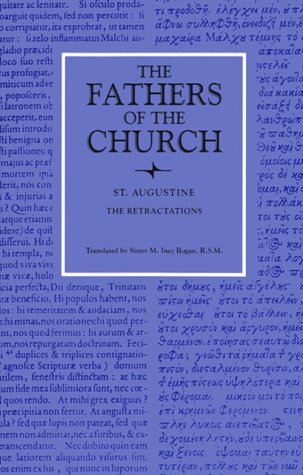- Bible
- Read the Bible
- Bible Versions
- Verse of the Day
- Reading Plans
- Verses by Topic
- Books of the Bible
- Bible Images
- Study
- Commentaries
- Concordances
- Dictionaries
- Encyclopedias
- Sermons
- Bible Atlas & Maps
- BP Wiki
- Devotionals
- Today's Devotionals
- Light of the World
- All Devotionals
- Inspirational Quotes
- More
- Picture Quotes
- Videos
- Inspirational
- Bible Study
- What The Bible Says
- Bible Q&As
- Daily Bread
- Bible by Genre
- Bible Stories
- Random Bible Verse
- Community
- Store
The Retractions (Fathers of the Church 60)
by Augustine
The major portion of St. Augustine's literary output listed, accounted for, and criticized by the author himself--such is the work here published in English translation for the first time. As the aged Augustine reread his extensive production, he sought to identify and to report to his widely scattered readership anything in his writings that had offended him or might offend others. In achieving this purpose, Augustine brought out a book scarcely to be matched in world literature.
Happily, it was toward the end of his life that the busy Bishop of Hippo set to this review; thus, but few of his "books" fail here to receive his searching self-criticism. His letters and sermons are in general not dealt with; they were to be covered in further parts of the RetractationsRetractations that Augustine did not live to achieve.
The extensive notes that the translator furnishes supply the background to Augustine's own discussion of each one of his 93 books, and both analyze and synthesize the bishop's large and wide-ranging production.
Happily, it was toward the end of his life that the busy Bishop of Hippo set to this review; thus, but few of his "books" fail here to receive his searching self-criticism. His letters and sermons are in general not dealt with; they were to be covered in further parts of the RetractationsRetractations that Augustine did not live to achieve.
The extensive notes that the translator furnishes supply the background to Augustine's own discussion of each one of his 93 books, and both analyze and synthesize the bishop's large and wide-ranging production.
BUY NOW
Paperback, 321 pages
Published June 1st 1999 by Catholic University of America Press (Washington, DC) (first published 428)
© 2025 Bibleportal.com All rights reserved.

Aurelius Augustinus - more commonly "St. Augustine of Hippo," or simply "Augustine" - was a philosopher and theologian, and one of the most important figures in the development of Western Christianity. He framed the concepts of original sin and just war. Augustine was one of the most prolific Latin authors in terms of surviving works, and the list of his works consists of more than a hundred separate titles.
Augustine took the view that the Biblical text should not be interpreted literally if it contradicts what we know from science and our God-given reason. Many Protestants, especially Calvinists, consider him to be one of the theological fathers of Reformation teaching on salvation and divine grace.
... Show more